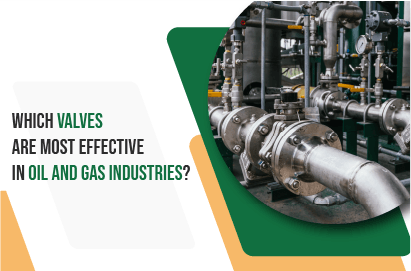The chemical and petrochemical industry depends on various equipment, and among them, ball valves are the most important. Ball valves can effectively control the flow of various fluids, gases, and vapours in different processes. Ball valves make sure that chemical processes run smoothly and safely.

The global market of ball valves is valued at $12 billion US, with top valve manufacturers located in Europe, Japan, China, and the U.S. This shows the size of the industry and the importance of valve components to the safety and success of the chemical and petrochemical sectors.
In today's article, we will talk about ball valves, their specific uses in chemical and petrochemical sectors, and how they help these industries for efficient operations.
So let's begin!
What are Ball Valves?
Ball valves are the most important components to effectively control the flow of fluids. The ball valve uses a spherical ball with a hole through the middle for fluid control. The ball is positioned between two seats. By turning a handle or actuator, this ball rotates 90 degrees to either allow or block the flow of liquid or gas.
These ball valves are highly reliable and versatile, hence they are widely used in the chemical and petrochemical industry. They are mostly used to shut off or isolate sections of a pipeline for easy maintenance and repairs.
Moreover, the design of ball valves minimises the risk of leaks. Hence, ball valves are the ideal valve for handling hazardous chemicals.
What are the Types of Ball Valves?
Ball valves come in several types, including:
Standard Ball Valves: These are the most common and are used for general fluid control applications.
V-Port Ball Valves: These valves offer precise flow control and are suitable for applications requiring fine adjustments.
Full Port Ball Valves: These valves have a larger opening. It enables maximum flow with minimal pressure drop.
Reduced Port Ball Valves: These types of ball valves feature smaller opening, which restricts flow. These types of valves are ideal for precise flow control.
Trunnion Ball Valve: These valves are specifically designed for high-pressure applications. The ball is supported by trunnions (bearings), which absorb the pressure from the flow.
Rubber Seated Ball Valve: It is most commonly used for general-purpose applications, especially where tight sealing is essential.
Floating Ball Valve: The ball is held in place by the compression of two elastomeric seats. These ball valves are best for lower pressure applications.
Choosing the right valve for your application require to consider several factors like:
- Fluid Type
- Pressure Rate
- Temperature Requirement
- Flow Rate
Furthermore, it is also required to consider the design, actuation methods, as well as maintenance requirements. It's always a good decision to consult with experts who can provide valuable advice and help you make the best decision.
Need the Best Ball Valves for Your Industrial Applications?
Explore our selection of high-performance ball valves to meet your needs.
What are the Key Functionalities of Ball Valves?
Starting or Stopping Fluid Flow
Ball valves are primarily used to start or stop the flow of fluids such as hydrocarbons, oil, steam, water, and acids. This start-stop/on-off feature is very important in processes that require precise control over fluid movement.
Regulating Flow
Ball valves can modulate the flow of fluids through pipelines, ensuring the desired flow rate is maintained. This regulation is vital for maintaining process stability and safety.
Flow Direction Control
In complex piping systems, ball valves can change the direction of fluid flow. It easily redirect materials to different parts of a plant or system.
Pressure Regulation
Ball valves regulate the pressure of fluids in various processes. This way, it prevents overpressure situations that could damage equipment or cause safety hazards.
Protecting Piping Systems
By controlling backflow and filtering debris, ball valves protect piping systems and equipment from damage caused by solid particles or reverse flows.
What are the Uses of Ball Valves in the Chemical and Petrochemical Industry ?
Ball valves are used across various industries, including engineering, machinery, oil and gas, and of course, chemical and petrochemical industries. The design and working principle of ball valves ensures that they meet industry-specific standards, making them suitable for a wide range of applications.
Application of Ball Valves in the Chemical Industry
The chemical industry produces and handles various chemicals and many of which are hazardous and corrosive. These types of valves used in chemical industries are perfect due to its robust design and reliable performance.
- Chemical Production: In chemical production processes, ball valves regulate the flow of raw materials, intermediates, and final products. They can effectively maintain the desired chemical reactions and product quality because of its accurate control over the quantities of components mixed.
- Safety and Containment: Ball valves ensure safety in chemical plants. They provide reliable isolation of hazardous substances, preventing accidental releases and ensuring safe maintenance and repair of equipment.You should always get ball valves from reputable ball valve suppliers because research shows that chemical process efficiency can be raised by up to 20% by utilizing best-quality ball valves.
- Corrosion Resistance: Many chemicals are highly corrosive, which makes piping systems and valves difficult to maintain. Ball valve manufacturers offer ball valves in various materials, including stainless steel and special alloys which offer excellent corrosion resistance. Hence, ball valves offer long-term reliable performance in corrosive environments.
Furthermore, in the petrochemical sector, ball valves typically last 10-15 years longer than other types of valves due to its robust design.
Application of Ball Valves in the Petrochemical Industry
The petrochemical industry processes crude oil and natural gas into useful products like fuels, lubricants, and chemicals. There are various types of valves used in petrochemical industries to regulate the flow and pressure of various chemicals. In this industry, ball valves are widely used in several critical applications, which includes:
- Hydrocarbon Processing: Petrochemical plants process hydrocarbons, which are the primary raw materials used to produce various chemicals and plastics. Ball valves are used to regulate the flow of hydrocarbons at different stages of processing. This way, ball valves precisely and safely handle of these volatile substances.As per studies, ball valves can sustain their performance in high-pressure environments with a success rate of more than 95%.
- Fluid Transportation: Ball valves are necessary for the fluid movement within a petrochemical industry. They control fluid flow between storage tanks, reactors, and processing units. Their capacity to create a tight seal stops leaks and guarantees secure and effective fluid transport.
- Pressure and Temperature Control: Extreme temperatures and pressures are common in petrochemical processes. Ball valves are designed to withstand these harsh conditions, providing reliable control over fluid flow and pressure. Hence, ball valves plays a very important role for maintaining process stability and safety in the petrochemical industry.
Why Ball Valves are Important in the Chemical and Petrochemical Industry?
Ball valves are vital in chemical and petrochemical plants for several reasons:
Fluid Control
Ball valves precisely regulate the flow of various chemicals from storage vessels to pipelines. And in the chemical and petrochemical industry fluid regulation is necessary to maintain safety and efficiency.
Shut-off Capabilities
Ball valves offer a tight seal, ensuring no leakage even after years of use. It can effectively handle hazardous and corrosive substances.
Furthermore, In case of an emergency, ball valves can quickly shut off the flow of chemicals, preventing accidents.
Versatility
Ball valves are made from materials that withstand the corrosive nature of many chemicals, ensuring long-term reliability. They can effectively operate under high pressures and temperatures, making them suitable for various applications.
Safety
Ball valves manufacturers offer automatic functions which will minimise physical contact with hazardous substances, protecting both workers and the environment. Moreover, as per research, implementation of ball valves has reduced leak incidents in chemical plants by 30%.
Factors to be Considered for Selecting Ball Valves
Choosing the right ball valve for a specific application involves several considerations, including:
- Material Compatibility: The valve material must be compatible with the chemicals because it will handle corrosion and degradation.
- Pressure and Temperature Ratings: The valve must withstand the operating pressure and temperature conditions. Mostly, ball valves can operate at temperatures ranging from -200℃ to 500℃.
- Seal Materials: The seals should be made from materials that can handle the specific chemicals and operating conditions.
- Size and Flow Requirements: The valve size should match the flow requirements of the system.
- Standards and Certifications: The valve should meet relevant industry standards and certifications for safety and performance.
Conclusion
Ball valves are very important in the chemical and petrochemical industries due to their durability, reliability, and ability to handle harsh conditions. They not only ensure operational safety but also offer smooth functioning of critical industrial processes. In a nutshell, ball valves effectively contribute to the modern industrial process.
Searching for the Perfect Ball Valves for Your Industry?
Get the best options designed to enhance your operations with us.



